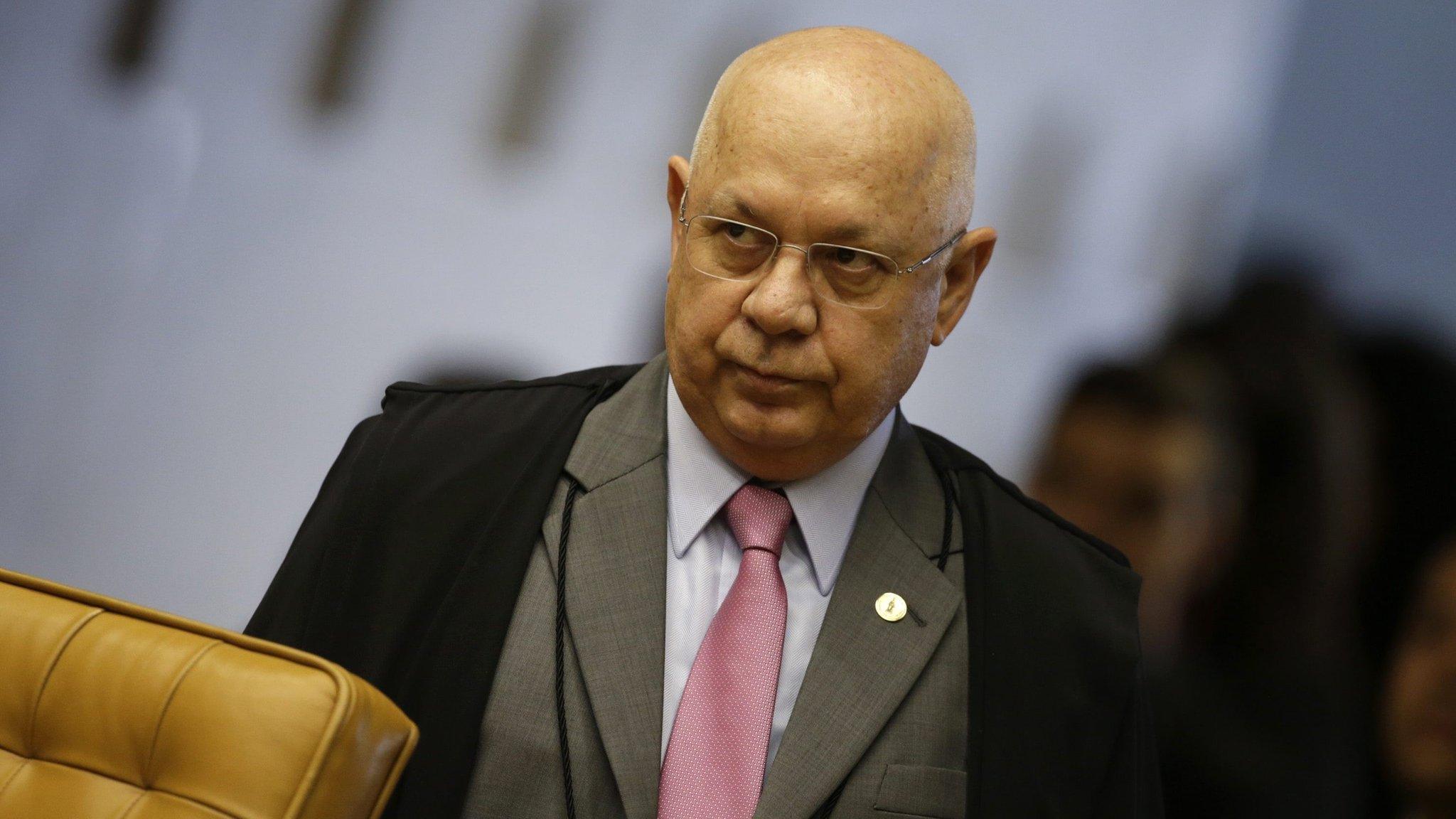Brazil judge targets dozens of politicians for ‘corruption’
- Published
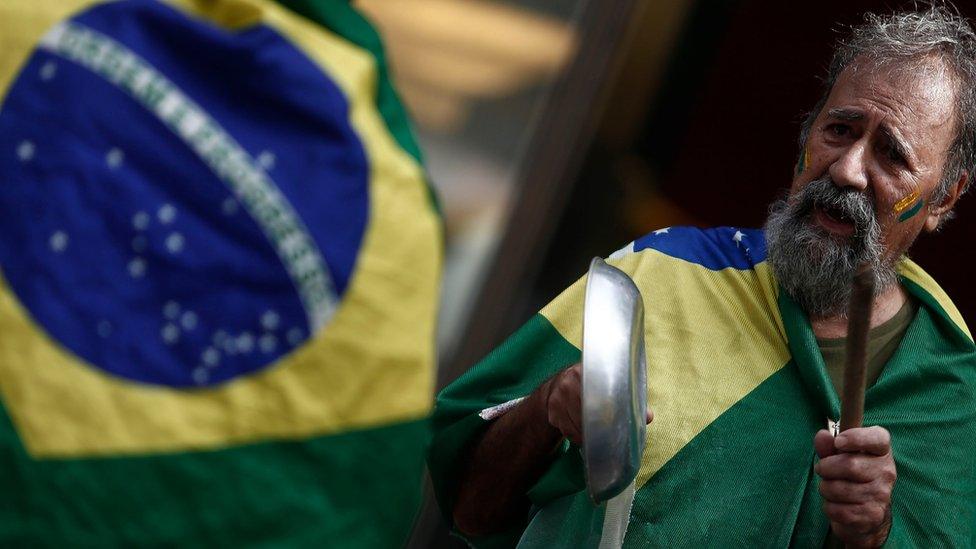
Anti-corruption protests have been taking place across the country
A Brazilian judge has revealed the names of dozens of politicians to be investigated over alleged involvement in a huge bribery scandal.
Judge Edson Fachin unveiled his extensive list on Tuesday, after much speculation in the country's media.
It includes almost a third of President Michel Temer's cabinet and Rio de Janeiro's mayor during the Olympics.
The names were given by corrupt former officials from Brazil-based construction giant Odebrecht.
The firm has admitted paying $1bn (£800m) in bribes.
Brazil corruption probe: A glossary
The list has been long awaited, and was delayed when the former judge attached to case died in a plane crash in January.
Key figures
Judge Fachin's list names a total of eight ministers, including Foreign Minister Aloysio Nunes and the president's chief of staff, plus scores of other members of Congress.
Its release is part of a major probe known as Operation Car Wash, which was launched three years ago amid escalating public discontent over political corruption.
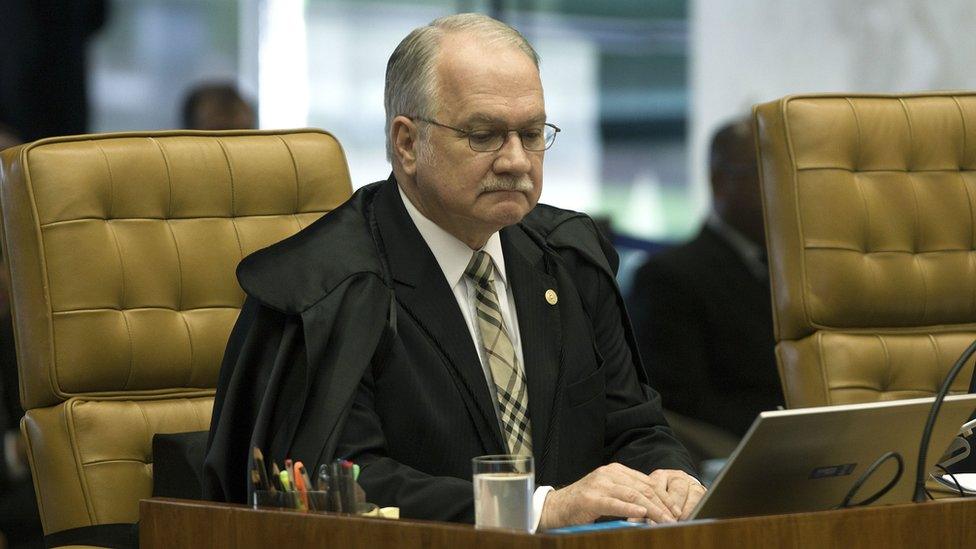
Judge Fachin's list contains the names of many of Brazil's political elite
The investigation centres on companies that were offered deals with state oil company Petrobras in exchange for bribes, which were funnelled into politicians' pockets and political-party slush funds.
Odebrecht, Latin America's largest construction conglomerate, is one of those companies, and 77 of its executives have entered into plea deals, agreeing to provide information in exchange for more lenient sentences.
The names on Judge Fachin's list have come to light as part of that plea bargain.
The executives say they paid so many bribes that they set up a special department to manage the money.
Although the list spans all major parties, the revelations strike a particular blow to President Temer, who came to power after the previous president was impeached for illegally manipulating government accounts.

Why is this list important? By the BBC's Daniel Gallas in Brazil
With Brazilian politics in complete disarray for the past years amid various corruption scandals, the big question has been who will win next year's presidential elections.
Tuesday's list of politicians who may be subject to new investigations in the Petrobras probe is a huge blow to the forces that were aligning for next year's campaign.
The Brazilian Social Democratic Party - the main opposition party while Brazil was governed by the Workers' Party from 2002 to 2016 - is now tainted before the electorate, with its leading figures having to answer questions about how their previous campaigns were financed.
The Workers' Party remains implicated, as does President Michel Temer's Brazilian Democratic Movement Party.
With virtually all high-profile mainstream politicians under fire, the release of the list may benefit people who portray themselves as "outsiders" in politics, such as Sao Paulo's mayor Joao Doria or environmentalist Marina Silva.

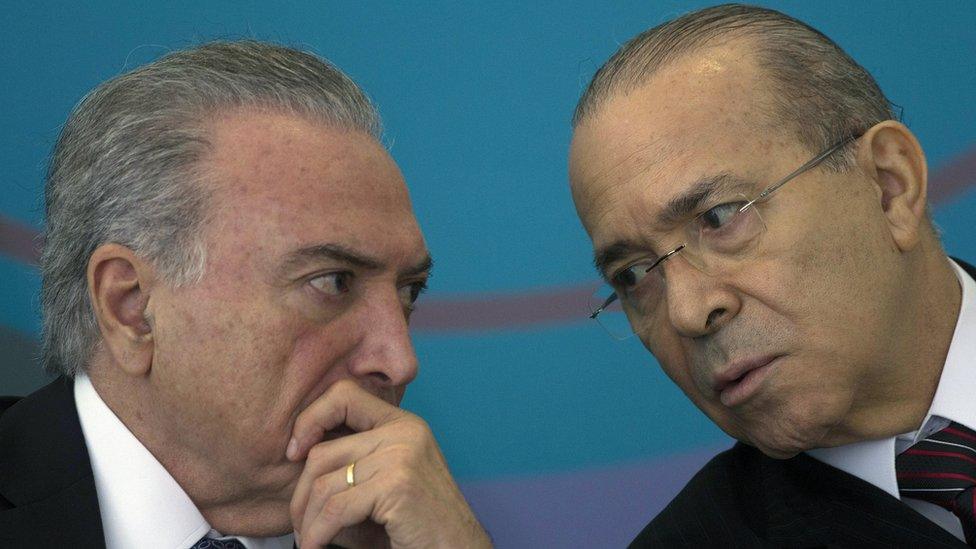
President Temer (left) and his chief of staff Mr Padilha (right), who is being investigated
Mr Temer's chief of staff, Eliseu Padilha, is among those named on the list. Mr Padilha has said he will defend himself in court.
President Temer's office has not commented on Judge Fachin's list, but he has vowed to suspend ministers who are charged as a result of the investigations.
The list also names a number of potential presidential candidates for elections in 2018, including opposition leader Aecio Neves and former foreign minister Jose Serra.
Reuters news agency said the list was so extensive it resembled a "Who's Who of Brazilian politics".
What is Operation Car Wash?
Operation Car Wash began in March 2014 as a federal police investigation into money laundering.
It initially centred on a currency exchange business at a petrol station in Brasilia.
The Posto da Torre station never had a mechanical car wash, just a few hoses, but the word play was considered apt and the media latched on to it as the investigations began to widen.
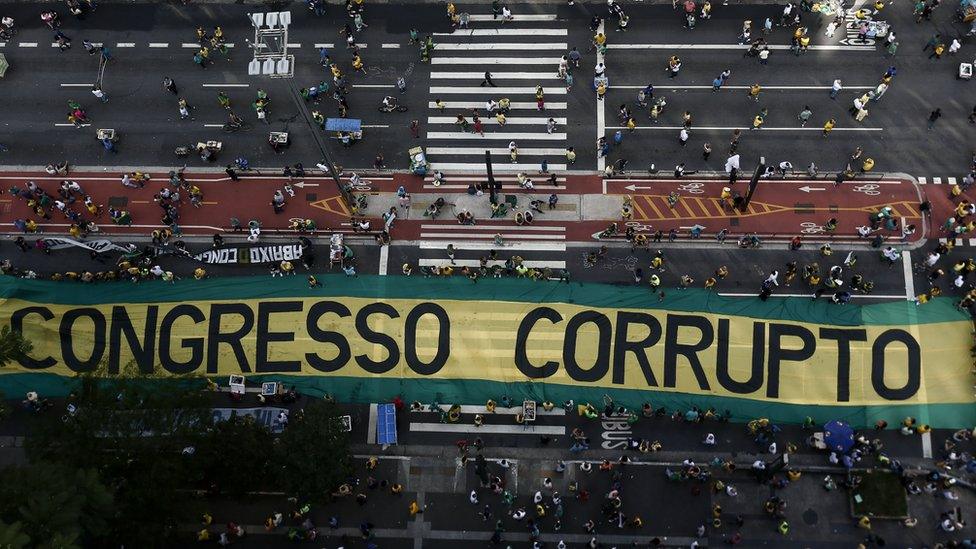
"Corrupt Congress": Operation Car Wash brought many supporters out on to the street in Sao Paulo
The team of prosecutors, which is based not in Brasilia, Sao Paulo or Rio de Janeiro, but the southern city of Curitiba, ended up uncovering corruption at the country's top echelons, including at Petrobras, and Odebrecht, and among the highest level of politicians.
The scandal provoked huge street protests nationwide.
Who is the judge?
Supreme court judge Edson Fachin was appointed, in February, to take charge of cases resulting from Operation Car Wash.
He took over from Judge Teori Zavascki, who died the previous month when his plane crashed into the sea.
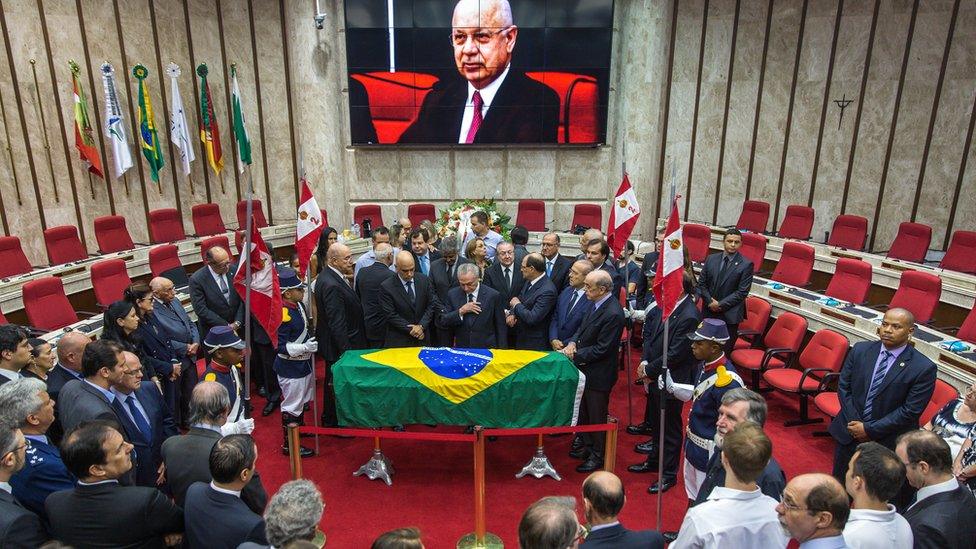
President Temer (c) at the funeral of Teori Zavascki, the supreme court judge who once led Operation Car Wash
Mr Fachin was chosen at random from a shortlist of five supreme court judges.
In Brazil, a supreme court judge is the only person with jurisdiction to try an active politician.
What happens next?
Brazil has been bracing itself for the repercussions of these investigations.
In the short term, allegations against nearly a third of President Temer's cabinet pose a threat to his efforts to pass austerity reforms, which he says are needed to lift the economy out of recession.
His chief of staff, who is now formerly linked to the scandal, has been seen as vital to negotiations to pass pension reforms.
The 2018 elections may also now end up with a different line-up than anticipated, after potential candidates find themselves under official investigation.
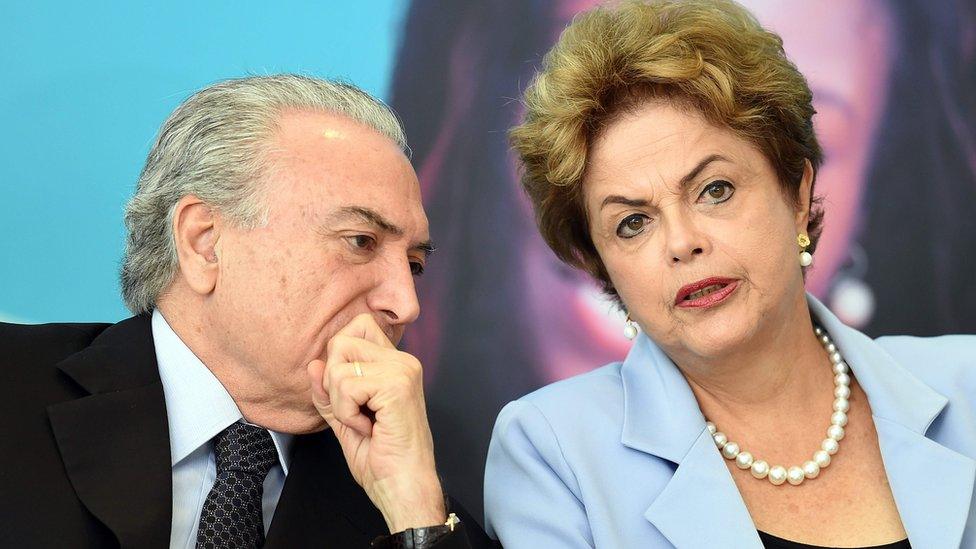
Michel Temer (l) and Dilma Rousseff (r) pictured before the impeachment, when he was vice president and she was president
Allegations of illegal financing of political campaigns have been another offshoot of Operation Car Wash.
Brazil's top electoral court is also investigating the 2014 presidential campaign, which led to Dilma Rousseff being elected with Mr Temer as her running mate.
Ms Rouseff was ousted in August 2016 for breaking fiscal laws and Mr Temer took her place.
If the tribunal decides that illegal funds were used to fund their campaign that bought them into power, the original election result could be annulled and President Temer could be forced from office.
- Published12 July 2017
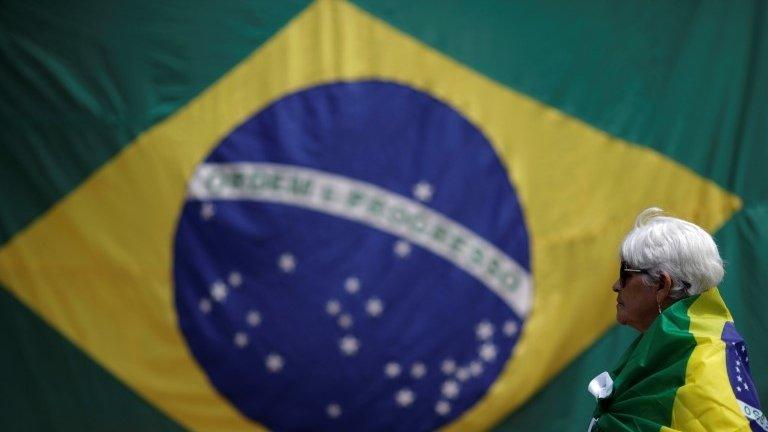
- Published20 January 2017
